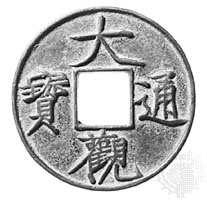Huizong
emperor of Song dynasty
Wade-Giles romanization Hui-tsung, also called Song Huizong, personal name (xingming) Zhao Ji
born 1082, China
died 1135, Yilan 【now in Heilongjiang province】
temple name (miaohao) of the eighth and penultimate emperor (reigned 1100–1125/26) of the Bei (Northern) Song dynasty (960–1127). He is best remembered both as a patron of the arts and as a painter and calligrapher.
 The Huizong emperor sought escape from affairs of state through the pleasures of arts and letters. He urged painters in his academy of painting to depict objects that were “true to colour and form,” inviting an extreme literalness of representation; his own paintings of birds and flowers were detailed, accurately coloured, and perfectly composed. He is also known as a calligrapher who excelled in an elegantly mannered style known as “slender gold.” Huizong sponsored the compilation of a major catalog of artists' biographies and paintings from the 3rd century to his time, known as the Xuanhe huapu (“Catalog of Paintings of the Xuanhe Emperor”).
The Huizong emperor sought escape from affairs of state through the pleasures of arts and letters. He urged painters in his academy of painting to depict objects that were “true to colour and form,” inviting an extreme literalness of representation; his own paintings of birds and flowers were detailed, accurately coloured, and perfectly composed. He is also known as a calligrapher who excelled in an elegantly mannered style known as “slender gold.” Huizong sponsored the compilation of a major catalog of artists' biographies and paintings from the 3rd century to his time, known as the Xuanhe huapu (“Catalog of Paintings of the Xuanhe Emperor”).Politically, the Huizong emperor's reign was fatal to the Bei Song dynasty. He promoted Daoism at the court and sought comfort and amusement in the arts, in amorous affairs, and in the construction of an extravagant new palace garden. He busied himself with requisitioning colourful stones, rare plants, and exotic pets for this garden, while leaving the administration of the state to others. Political disputes between conservatives and reformers went unresolved, and the emperor's favourite eunuchs gained unprecedented power in the government.
Threatened by the expanding Liao (Liao dynasty) empire in the north, the Huizong emperor formed an alliance with the Juchen (Chinese: Nüzhen, or Ruzhen) tribes of Manchuria (now the Northeast region of China). The resulting victory over the Liao was wholly illusory, since it was the Juchen who turned out to be the real menace. In mounting crisis, Huizong abdicated in 1125/26 in favour of his son, Zhao Huan (the Qinzong emperor), who reigned for less than two years. In 1127 the invading Juchen ended the Bei Song dynasty and sacked the Song capital ( Kaifeng). Both Huizong and his son were captured and lived in exile in Manchuria under miserable conditions until their deaths.